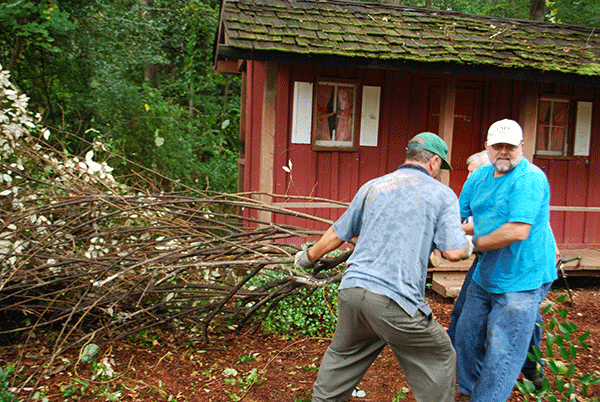
By Katie Jackson
I recently got into a scrap with some plants in my yard and I have the scars to prove it, but they are scars I wear proudly.
Those plants, Chinese privet and Elaeagnus (also known as thorny olive and other names I can’t repeat here but ones I’ve probably used in the heat of my hands-on tussle with them) are all over my yard. Trying to evict them is quite a fight but I am dedicated to the effort, especially now that I am more aware of the dangers they pose.
Actually I’ve been aware of their bad reputations for a number of years but I have been a bit of a coward. Sure, I’ve executed surgical strikes against them in the past, ambushing seedlings and randomly attacking some of the bigger bullies with pruners. But I’ve felt so outnumbered by them that I’ve been afraid to launch a full-fledged assault…until, that is, my courage was bolstered by an Opelika Plant Wars boot camp.
Opelika’s Plant Wars was held in September when several local groups rallied their forces to take on invasive plants. Lee County Master Gardener Billie Oliver and the Auburn University Donald E. Davis Arboretum curator and native plant advocate Dee Smith led the charge with the help of municipal and civic groups, the Alabama Invasive Plant Council (ALPIC) and invasive plant experts from Auburn University.
While that effort only made a small dent in the invasive plants at the park, it was a beginning. And it provided me with enough knowledge and ammunition to go home and do some hand-to-limb combat with my own intruders.
Invasive plants, defined by the U.S. Forest Service as non-native (exotic) plant species capable of causing environmental, economic or human harm, often displacing native species, reducing native wildlife habitat, disrupting important ecosystem processes and degrading recreation areas.
According to Loewenstein, executive director of ALIPC and a research fellow and invasive plant Extension specialist in Auburn University’s School of Forestry and Wildlife Sciences, millions of dollars are spent each year controlling these plants across the nation. But invasive plants also impose a “cost” on nature as, over time, they replace native plant species, impact wildlife and fish habitat and affect the functioning of local ecosystems.
Certainly not all non-native, exotic plants are invasive and many are safe and valuable agricultural and horticultural staples. But aggressive non-natives become a problem when they escape cultivation and spread to home landscapes, pastures and croplands, forests, wetlands, waterways and rights-of-way.
Many are readily available from plant retail outlets and are so common and accepted in our landscapes that homeowners may not realize the threat they pose. They also provide food for wildlife and pollinators, so they may seem to be benefiting the environment, but birds and other wildlife actually help spread the seeds and there are other, better native plants that can be used to support bird and bee populations.
Among the worst offenders that are common on probably all of our properties are the thorny olive and Chinese privet as well as other ligustrums that I’ve been battling at home; some cultivars of nandinas (heavenly bamboo), honeysuckle and wisteria; multiflora, Cherokee and Maccartney roses; and mimosa, kudzu, Callery pear tree hybrids and tallow (popcorn), chinaberry and Chinese elm trees to name a few. Forest and agricultural landowners also battle these and other invasives, such as cogongrass and Japanese climbing fern, and milfoil, hydrilla and alligator weed are major problems in lakes and other Alabama waterways.
Though many of these plants have beautiful foliage, berries and flowers, and may have a sentimental attachment for those of us who have grown up with them, their bad traits far outweigh their positive attributes and it’s truly important to remove them from our yards. The good news is that, with lots of hard work and a well-organized plan of attack, they can be controlled (sadly, probably never eradicated) and there are lots of native plants that can be used in their place.
To learn more about invasive plants, how to battle them and what plants can be used to replace them, visit the ALIPC website at www.se-eppc.org/alabama/ or check with your county Cooperative Extension or Alabama Forestry Commission offices. They, along with local Master Gardener groups, have lots of information and strategies to share so that you can wage war against invasive plants and make your yard a safe haven for native plants and all the creatures that rely upon them.
If you want to learn more about or buy native plants, a workshop and plant sale will be held by the Davis Arboretum on Monday, Nov. 4, at 5:30 in room 112 of the Rouse Life Sciences building on the Auburn campus. To learn more about that contact 334-844-5770 or [email protected].
November Tips
Fertilize shade trees.
Plant woody shrubs, vines, trees and roses.
Store unused pesticides in sealed containers and place them in freeze-protected locations.
Prepare lawn mowers and other power tools for winter storage by cleaning them and flushing out remaining gasoline.
Turn the compost pile.
Test your soil and begin adding needed amendments once the results are in.
Mulch tender perennials that might be damaged by frost later in the winter.
Bring tender potted plants into the house or place in some protected area before the first hard freeze.
Plant leafy greens such as lettuce, arugula and spinach, as well as garlic and shallots.
Plant spring-blooming bulbs.
Plant beets, carrots, radishes and asparagus.
Plant annual flowers such as sweet peas, poppies, snapdragons, larkspurs and delphiniums.
Keep bird feeders cleaned and filled.




